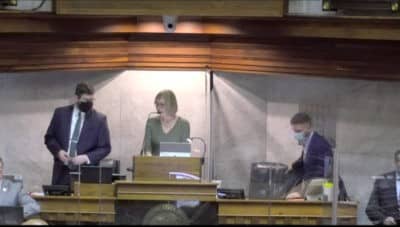
The Indiana Senate voted Monday to override Gov. Eric Holcomb’s veto of 2020 legislation that limited local governments’ authority to regulate dealings between tenants and landlords.
This could be the first time Holcomb has a veto undone if the Indiana House also votes to override.

Holcomb vetoed Senate Enrolled Act 148 in March 2020, saying the language was “overly broad,” and that “it would prevent almost any type of local control over landlord-tenant relationships.” It was only the second veto that Holcomb has issued. The first was on a bill that dealt with fees for public requests in 2017, and it was not overridden.
“I remain confident in my past decision to veto Senate Enrolled Act 148 last year. To be sure, we are still navigating through this once-in-a-century pandemic and therefore I still believe this is not the right time for that overly broad language to have become law,” Gov Holcomb said in a statement Monday after the vote to override. “While I obviously disagree with their decision to override my veto, I hope the General Assembly will take a careful look at how this new law will affect local residents and units of government.”
SEA 148 originally looked at zoning and housing matters, specifically in mobile home communities. However, it was later amended to deal with issues of landlord-tenant relationships such as requiring landlords to notify tenants of their rights and the handling of security deposits. As amended, the bill would negate some of the housing protections put in place by Indianapolis last year.
The Senate voted 30-17 to override the veto Monday, with all Democrats choosing to uphold Holcomb’s veto and most Republicans voting to override the veto of a governor of their own party.
Sen. Shelli Yoder, D-Bloomington, argued that an override was only going to make what advocates fear is a looming eviction crisis worse in the state.
“Why are we discussing legislation that would only quicken homelessness for those in our state?” Yoder said. “This override is a major step backwards.”
Indianapolis Mayor Joe Hogsett released a statement following the override vote, saying, “When the Indianapolis City of Indianapolis City-County Council passed proposals 40 and 41 early last year, Indianapolis already had one of the highest eviction rates in the country.
“Now, estimates indicate that as many as 250,000 households in Indiana are behind on rent and at risk of eviction when the current federal moratorium expires in less than two months–which could represent as many as 50,000 families facing impending crisis here in Marion County.”
In response to the criticism of the proposal to override, Sen. Aaron Freeman, R-Indianapolis, argued that landlords would still be held accountable because the issues are already covered by state and federal law.
Freeman also talked about the livelihood of landlords during the pandemic. He cited stories from people who had bought places to rent before the COVID-19 outbreak, leaving them struggling to pay for it as eviction moratoriums continued to be passed.
Freeman also said additional legislation is planned to clarify the wording of SEA 148 in response to Holcomb’s concern about its vagueness.
Taylor Dixon is a reporter for TheStatehouseFile.com, a news website powered by Franklin College journalism students.